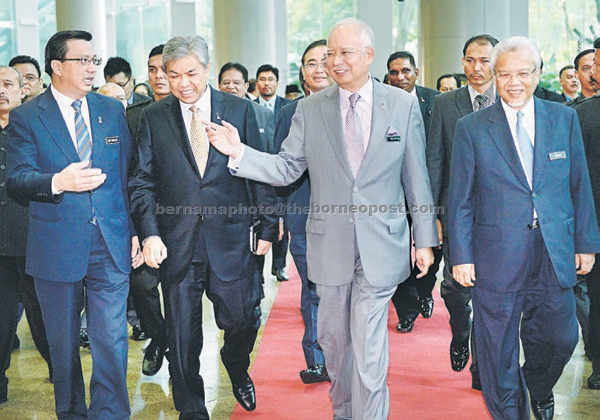
Najib (second right) and other cabinet minister walking out after the former tabled the budget recalibration at the Putrajaya International Convention Centre (PICC). — Bernama photo
KUALA LUMPUR: The recalibration of Budget 2016 necessitated by the volatile global economy is not all about expenditure cuts. It also concerns helping Malaysians, especially on the lower scale, cope with the rising cost of living.
While the government will be more prudent in its spending to optimise operating and development expenditure, it will still give priority to ‘rakyat-centric’ projects and programmes.
The measures that Prime Minister Datuk Seri Najib Tun Razak announced yesterday to restructure the budget are “to ensure sustainable economic growth and, more importantly, to safeguard the wellbeing of the rakyat”.
One move, Najib said, is for EPF contributions from employees to be reduced by three per cent. This is expected to increase private sector spending by RM8 billion a year.
Another measure is the giving of tax relief of up to RM2,000 to people earning RM8,000 or less a month. This will benefit some two million tax payers.
To reduce the cost of daily basic necessities, the government will liberalise the control of import quotas or Approved Permits or APs for eight agricultural products, including coffee beans and meats.
Najib, whose speech at the Putrajaya International Convention Centre was telecast live, said the MyBeras programme will be introduced where every registered hardcore household will be supplied with 20kg of rice every month until December 2016.
The budget adjustments also heeded the clamour for affordable and comfortable shelter.
With immediate effect, all units priced up to RM300,000 at new housing projects can only be sold to first-time buyers.
Other measures that the Prime Minister spelled out included increasing allocations to SMEs (Small and Medium Enterprises) and start-up companies. The money will come from development financial institutions and government venture capital funds.
Explaining the need for adjustments to the budget, Najib referred to the global economic realities, especially the slump in the oil price and the slower growth in the United States and China.
He said the prudent measures to be taken were expected to save RM9 billion in operating and development expenditure.
Najib, however, gave an assurance that BR1M and welfare assistance programmes will continue to be implemented.
He said the cuts will not touch the emoluments of civil servants and the pensions of retirees, and will not affect the delivery mechanism of the government.
The government will not terminate the service of any of its employees, including those appointed on contract basis.
The Prime Minister said the government had decided to revise the 2016 forecast for economic growth to between four and 4.5 per cent. (The earlier forecast was between four and five per cent.)
He also said that Malaysia will not impose capital controls or peg the Ringgit as it did during the 1997-98 Asian financial crisis.
Najib is confident that the country will overcome the present “difficult challenges”.
“We have done it before. God willing, we can do it again,” he said. — Bernama
